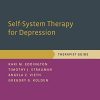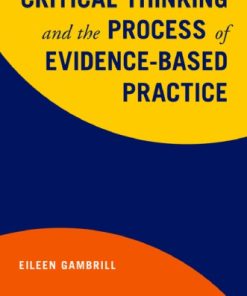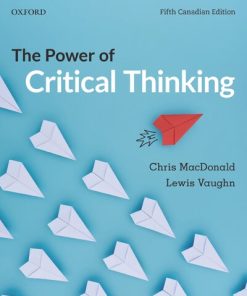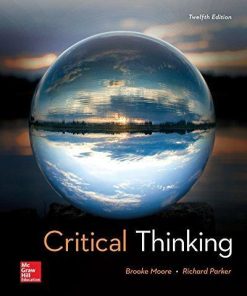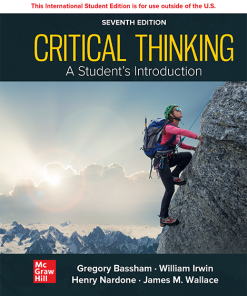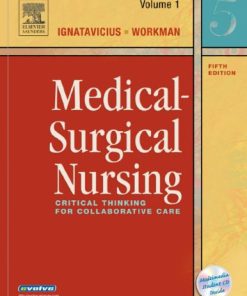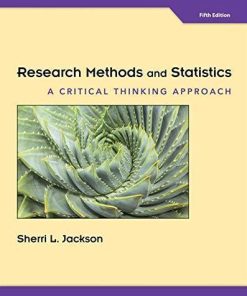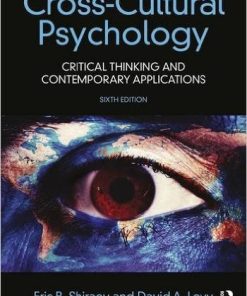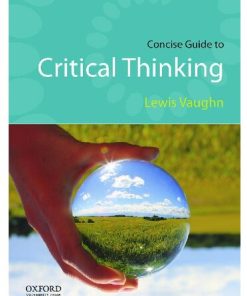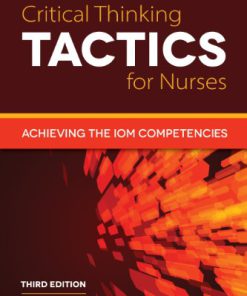(EBOOK PDF)Critical Thinking 12th Edition by Brooke Noel Moore, Richard Parker 1259690873 9781259690877 full chapters
$50.00 Original price was: $50.00.$25.00Current price is: $25.00.
Critical Thinking 12th Edition by Brooke Noel Moore, Richard Parker – Ebook PDF Instant Download/Delivery: 1259690873, 9781259690877
Full download Critical Thinking 12th Edition after payment
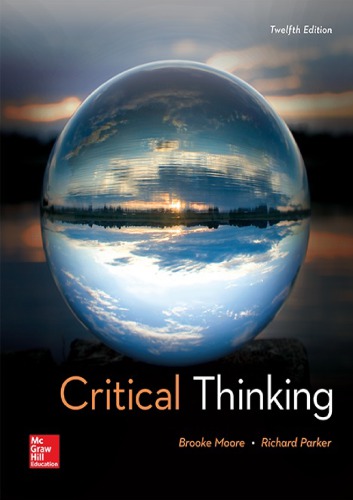
Product details:
• ISBN 10:1259690873
• ISBN 13:9781259690877
• Author:Brooke Noel Moore, Richard Parker
The first integrated program designed specifically for the critical thinking course, Moore & Parker’s Critical Thinking teaches students the skills they need in order to think for themselves – skills they will call upon in this course, in other college courses, and in the world that awaits. The authors’ practical and accessible approach illustrates core concepts with concrete real-world examples, extensive practice exercises, and a thoughtful set of pedagogical features. Connect and LearnSmart for Critical Thinking coalesce in a highly adaptive learning environment where each student gets the targeted help he or she needs for more efficient mastery of course concepts.
Critical Thinking 12th Table of contents:
Contents
Preface
Introduction
A Start-up Definition of Critical Thinking
How Skilled Are You as a Thinker?
Good Thinking Requires Hard Work
The Concept of Critical Thinking
Become a Critic of Your Thinking
Establish New Habits of Thought
Develop Confidence in Your Ability to Reason and Figure Things Out
Chapter 1
Becoming a Fair-minded Thinker
Weak vs. Strong Critical Thinking
What Does Fair-Mindedness Require?
Intellectual Humility: Strive to Discover the Extent of Their Ignorance
Intellectual Courage: Develop the Courage to Challenge Popular Beliefs
Intellectual Empathy: Learn to Empathically Enter Opposing Views
Intellectual Integrity:
Hold Yourself to the Same Standards to Which They Hold Others
Intellectual Perseverance:
Refuse to Give Up Easily, Work Your Way Through Complexities and Frustration
Confidence In Reason:
Respect Evidence and Reasoning and Value Them as Tools for Discovering the Truth
Intellectual Autonomy: Value Independence of Thought
Recognize the Interdependence of Intellectual Virtues
Conclusion 19
Chapter 2
The First Four Stages of Development 21
Stage One: The Unreflective Thinker 23
Stage Two: The Challenged Thinker 24
Stage Three: The Beginning Thinker 26
Stage Four: The Practicing Thinker 30
Chapter 3
Self-Understanding 37
Monitor the Egocentrism in Your Thought and Life 38
Make a Commitment to Fair-Mindedness 39
Recognize the Mind’s Three Distinctive Functions 40
Understand That You Have a Special Relationship to Your Mind 42
Connect Academic Subjects to Your Life and Problems 46
Learn Both Intellectually and Emotionally 46
Chapter 4
The Parts of Thinking 49
Reasoning Is Everywhere in Human Life 50
Reasoning Has Parts 51
The Elements of Thought: A First Look
How the Parts of Thinking Fit Together
The Relationship Between the Elements
The Best Thinkers Think to Some Purpose 60
The Best Thinkers Take Command of Concepts 61
The Best Thinkers Assess Information 64
The Best Thinkers Distinguish Between Inferences and Assumptions 70
The Best Thinkers Think Through Implications 77
The Best Thinkers Think Across Points of View 79
The Point of View of the Critical Thinker 81
Conclusion 82
Chapter 5
The Standards for Thinking 83
Taking a Deeper Look at Intellectual Standards 84
Clarity · Accuracy · Precision · Relevance · Depth · Breadth · Logicalness · Significance · Fairness
Bringing Together the Elements of Reasoning and the Intellectual Standards 95
Purpose, Goal, or End In View · Question at Issue or Problem to Be Solved · Point of View or Frame of Reference · Information, Data, Experiences · Concepts, Theories, Ideas · Assumptions · Implications and Consequences · Inferences
Brief Guidelines For Using Intellectual Standards
Chapter 6
Asking Questions That Lead to Good Thinking 113
The Importance of Questioning 114
Dead Questions Reflect Inert Minds 115
Three Categories of Questions 116
Become a Socratic Questioner 120
Focus Your Thinking on the Type of Question Being Asked · Focus Your Questions on Universal Intellectual Standards for Thought · Focus Your Questions on the Elements of Thought · Focus Your Questions on Prior Questions · Focus Your Questions on Domains of Thinking
Conclusion 131
Chapter 7
Master the Thinking, Master the Content 133
Go Beyond Superficial Memorization to Deep Learning 134
The Relation of Content to Thinking 136
Understand Content Through Thinking and Thinking Through Content 136
Think Through Your Classes Using Your Knowledge of Thinking 139
Chapter 8
Discover How the Best Thinkers Learn
18 Ideas for Improving Your Studies
The Logic of a College as It Is 144
How the Best Students Learn
The Design of a College Class 146
Figure Out the Underlying Concept of Your Courses 148
Figure Out the Form of Thinking Essential to Courses or Subjects 150
Think Within the Logic of the Subject 152
A Case: The Logic of Biochemistry 153
Make the Design of the Course Work for You 156
Sample Course: American History, 1600-1800 158
Reading, Writing, Speaking, Listening, and Thinking 164
Figure Out the Logic of an Article or Essay 166
Figure Out the Logic of a Textbook 167
Criteria for Evaluating an Author’s Reasoning 168
A Test To Repeat In Every Class & Subject
Chapter 9
Redefining Grades as Levels of Thinking and Learning 171
Develop Strategies for Assessing Your Learning 172
Use Student Profiles to Assess Your Performance 172
Exemplary Students (Grade of A)
High Performing Students (Grade of B)
Mixed-Quality Students (Grade of C)
Low-Performing Students (Grade of D or F)
Apply Student Profiles to Assess Your Performance Within Specific Disciplines:
Exemplified by an Introduction to Psychology Course
Exemplary to Low-Performing
Conclusion 181
Chapter 10
Making Decisions and Solving Problems 183
Part I: Making Decisions
Evaluating Patterns in Decision-Making 184
“Big” Decisions 185
The Logic of Decision-Making 185
Recognizing the Need for an Important Decision · Accurately Recognizing the Alternatives · Putting More Time into Your Decision-Making · Being Systematic · Dealing with One Major Decision at a Time · Developing Knowledge of Your Ignorance
Dimensions of Decision-Making 188
The Early Decisions (2-11 Years of Age) 190
Adolescent Decisions (12-17 Years of Age) 191
Conclusion 193
Part II: Solving Problems 195
Becoming an Activist Problem-Solver 196
Evaluating Patterns in Your Problem-Solving 197
Dissolving Pseudo-Problems 197
False Needs and Irrational Ends 197
“Big” Problems 198
Dimensions of Problem-Solving 199
Avoiding the Pitfalls of Problem-Solving 204
Analyze Problems Using the Elements of Thought 207
The Art of Problem-Solving 209
Chapter 11
Deal With Your Irrational Mind
Part I: The Best Thinkers Take Charge of Their Egocentric Nature
Understand Egocentric Thinking 214
Understand Egocentrism as a Mind Within the Mind 215
Successful Egocentric Thinking
Unsuccessful Egocentric Thinking 219
Rational Thinking 222
Two Egocentric Functions 225
Egocentric Domination
Egocentric Submission
Pathological Tendencies of the Human Mind 235
Challenge the Pathological Tendencies of Your Minds 236
The Challenge of Rationality 238
Part II: The Best Thinkers Take Charge of Their Sociocentric Thinking
The Nature of Sociocentrism
Social Stratification
Sociocentric Thinking Is Unconscious and Potentially Dangerous
Sociocentric Uses of Language
Disclose Sociocentric Thinking Through Conceptual Analysis
Reveal Ideology at Work Through Conceptual Analysis
Conclusion:
Work to Free Yourself from Egocentric and Sociocentric Thought
CHAPTER 12:
How to Detect Media Bias and Propaganda
Democracy and the News Media
Myths That Obscure the Logic of the News Media
Bias and Objectivity in the News Media
Forms of Objectivity
The Perception of Bias in the Mainstream
Propaganda and News Story Writing
Protecting the Home Audience from Guilt Feelings
Fostering Sociocentric Thinking
Slanting Stories to Favor Privileged Views
How to Obtain Useful Information from Propaganda
and Standard News Stories
Steps in Becoming a Critical Consumer
of the “News”
Media Awareness of Media Bias
Sensitivity to Advertisers
Sensitivity to Government
Sensitivity to Powerful Interests
Sensitivity to Their Competitors
The Bias Toward “Novelty” and “Sensationalism”
Critical Consumers of the News
Is It Possible for the News Media to Reform?
Is the Emergence of a “Critical Society” Possible?
Dominant and Dissenting Views:
Finding Alternative Sources of Information
Becoming an Independent Thinker
Buried, Ignored, or Underreported Stories
Using the Internet
Additional Alternative News Sources
Conclusion
An Abbreviated Glossary
CHAPTER 13
Fallacies: The Art of Mental Trickery & Manipulation
Truth & Deception in the Human Mind
Uncritical Persons (intellectually unskilled thinkers)
Skilled Manipulators (weak-sense critical thinkers)
Fair-minded Critical Persons (strong-sense critical thinkers)
The Concept of Fallacies of Thought
Naming Fallacies
Mistakes Versus Fallacies
There is No Exhaustive List of Fallacies
Faulty Generalizations
Analyzing Generalizations
Post Hoc Generalizations
Analogies and Metaphors
44 Foul Ways to Win an Argument
Accuse Your Opponent of Doing What He is Accusing You of or worse
Accuse Him of Sliding Down A Slippery Slope (that leads to disaster)
Appeal to Authority
Appeal to Experience
Appeal to Fear
Appeal to Pity (or sympathy)
Appeal to Popular Passions
Appeal to Tradition or Faith (“the tried and true”)
Assume a Posture of Righteousness
Attack the person (and not the argument)
Beg the Question
Call For Perfection (Demand impossible conditions)
Create a False Dilemma (the Great Either/Or)
Devise Analogies (and Metaphors) That Support Your View (even if they are misleading or “false”).
Question Your Opponent’s Conclusions
Create Misgivings: Where There’s Smoke, There’s Fire
Create A Straw Man
Deny or Defend Your Inconsistencies
Demonize His Side Sanitize Yours
Evade Questions, Gracefully
Flatter Your Audience
Hedge What You Say
Ignore the Evidence
Ignore the Main Point
Attack Evidence (That Undermines Your Case)
Insist Loudly on a Minor Point
Use the Hard-Cruel-World Argument (to justify doing what is usually considered unethical).
Make (Sweeping) Glittering Generalizations
Make Much of Any Inconsistencies in Your Opponent’s Position
Make Your Opponent Look Ridiculous (“Lost in the Laugh”)
Oversimplify the Issue
Raise Nothing But Objections
Rewrite History (Have It Your Way)
Seek Your Vested Interests
Shift the Ground.
Shift the Burden of Proof
Spin, Spin, Spin
Talk in Vague Generalities.
Talk Double Talk
Tell Big Lies
Treat Abstract Words and Symbols As If They Were Real Things
Throw In A Red Herring (or two)
Throw in Some Statistics
Use Double Standards (whenever you can)
Fallacy Detection: Analyzing a Speech from the Past
Fallacy Detection: Analyzing a Current Presidential Speech
Fallacy Detection: Analyzing a Speech from a Presidential Candidate
Avoid Two Extremes:
1) Finding Fallacies Only in the Thinking of Others (None in Yourself), and
2) Finding an Equal Number of Fallacies in Everything you Read.
Conclusion: Fallacies in An Ideal (And in a Real) World
Chapter 14
Developing as an Ethical Reasoner
Why People Are Confused About Ethics
The Fundamentals of Ethical Reasoning
Ethical Concepts and Principles · The Universal Nature of Ethical Principles · Distinguishing Ethics from Other Domains of Thinking · Ethics and Religion · Ethics and Social Conventions · Ethics and the Law · Ethics and Sexual Taboos · Understanding Our Native Selfishness
Chapter 15
Learning & Using Information Critically & Ethically, Part One
A Critique of Disciplines
The Ideal of Knowledge Acquisition
True Loyalty to a Discipline
The Gap Between Fact and Ideal
The Ideal Compared to the Real
The Ideal of Mathematics: Abstract Quantification
The Ideal of Science: Physics, Chemistry, Astronomy, Geology, Biology
The Ideal of Science: History, Sociology, Anthropology, Economics, Psychology
The Ideal of the Arts and Humanities: Music, Painting, Sculpture, Architecture, Dance, Literature, Philosophy
Conclusion
Chapter 16
Learning & Using Information Critically & Ethically, Part Two
The Method & A Model Case
Realistic Understanding
Be a Critic, Not a Cynic
Recognize the Mental Nature of Knowledge
Develop Awareness of the Harm from Misuse of Information
Question Academic and “Expert” Information
Question the Status of Knowledge in a Field
A Model Case: Questioning Psychology and the Mental Health Professions
The Milgram Experiment
Scientific Studies in the Psychology
A Dark Side of the Mental Health Professions
Legitimizing Deeply Held Social Beliefs
Questioning “Psychotherapy”
Learning from Suspect Claims of Psychology and the Mental Health Professions
Thinking Psychologically: A Postscript
Chapter 17
Strategic Thinking, Part One
Understanding and Using Strategic Thinking
Components of Strategic Thinking
The Beginnings of Strategic Thinking
Key Idea 1 Thoughts, Feelings, and Desires are Interdependent
Key Idea 2 There Is a Logic to This, and You Can Figure It Out
Key Idea 3 For Thinking to Be of High Quality, We Must Routinely Assess It
Chapter 18
Strategic Thinking, Part Two
Key Idea 4 Understanding Our Native Egocentrism
as a Default Mechanism
Key Idea 5 We Must Become Sensitive to the Egocentrism
of Those Around Us
Key Idea 6 The Mind Tends to Generalize Beyond
the Original Experience
Key Idea 7 Egocentric Thinking Appears to the Mind as Rational
Key Idea 8 The Egocentric Mind Is Automatic in Nature
Key Idea 9 We Often Pursue Power Through Dominating
or Submissive Behavior
Key Idea 10 Humans Are Naturally Sociocentric Animals
Key Idea 11 Developing Rationality Requires Work
Conclusion
Chapter 19
Becoming an Advanced Thinker
Practicing Skilled Thinking
Stage Five: Reaching the Advanced Stage of Development
Stage Six: Becoming a Master Thinker
Qualities of Mind of a Master Thinker
The Ideal Thinker
Appendices
A Critical Questions About Critical Thinking
B Sample Analyses of “The Logic of . . .”
C Article: “Iraq Is a Pediatrician’s Hell: No Way to Stop the Dying”
Glossary
References
Index
People also search for Critical Thinking 12th:
critical thinking 12th edition brooke noel moore
brooke noel moore critical thinking
critical thinking brooke moore
brooke noel moore
Tags:
Critical Thinking,Thinking 12th, Brooke Noel Moore, Richard Parker
You may also like…
Politics & Philosophy - Social Sciences
Critical Thinking and the Process of Evidence-Based Practice
Politics & Philosophy - General & Miscellaneous Philosophy
The Power of Critical Thinking 5th Edition by Chris Macdonald 019903043X 978-0199030439
Uncategorized
Uncategorized
Politics & Philosophy - Anthropology



